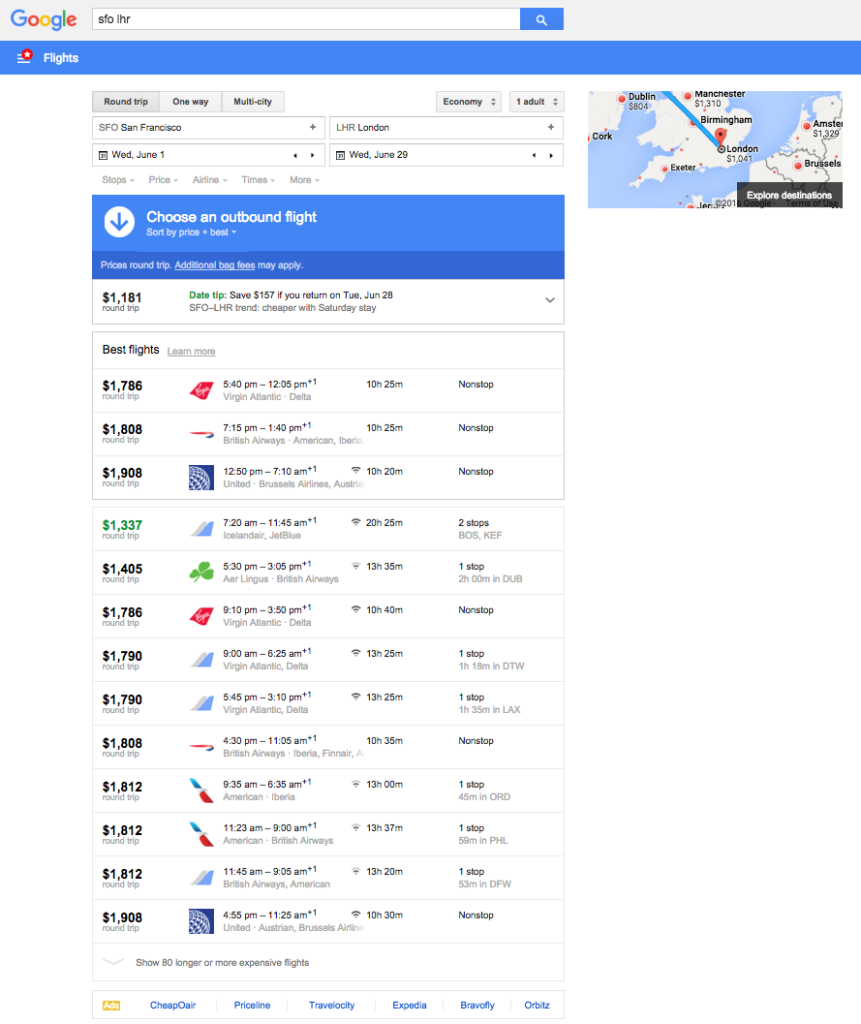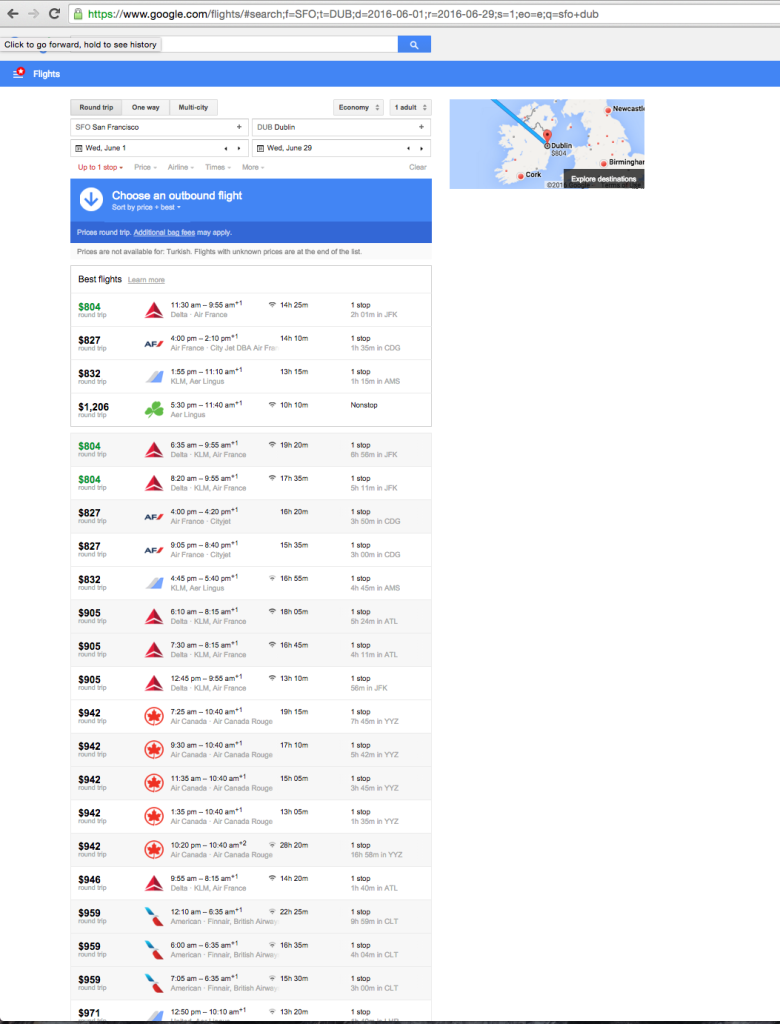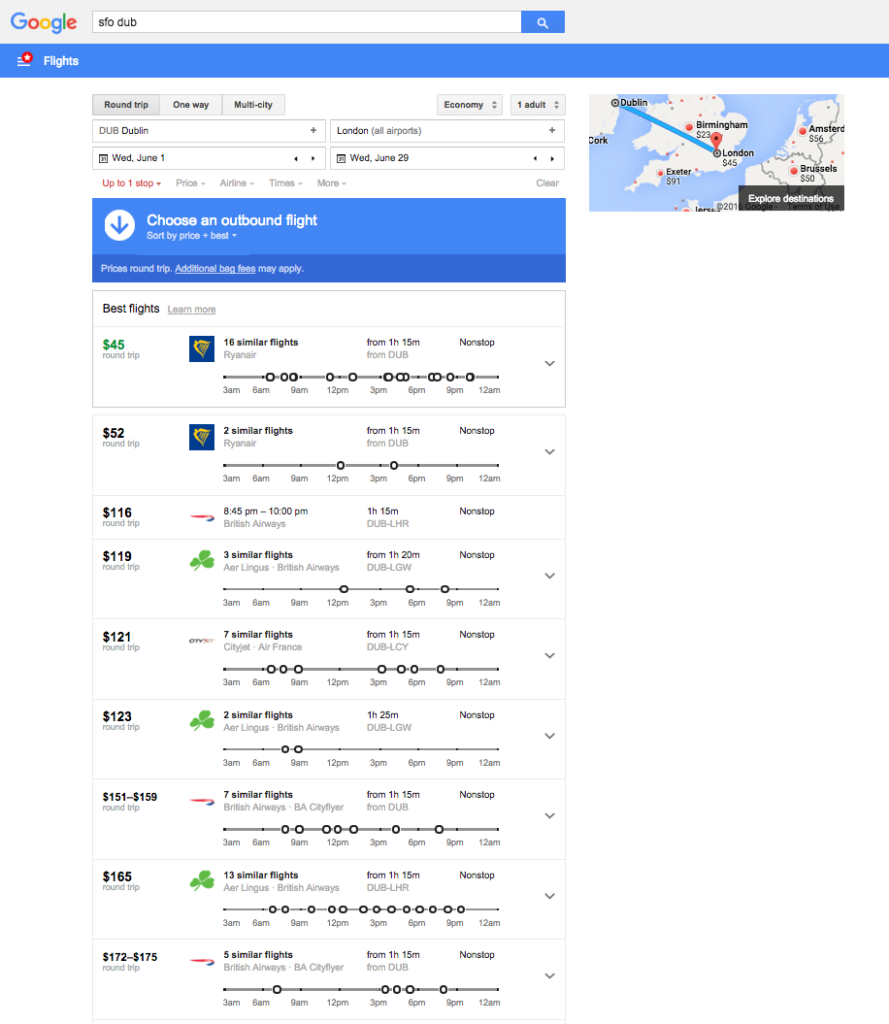Recently, a co-worker of mine asked for help booking his family’s summer travel to London. Searching for himself, his wife, and three kids, the price he had found (despite building in flexibility on both ends of the trip) was $14,000 for 5 people.
….for economy.
Summer travel to Europe is expensive. London travel is even worse, because it always has a steady flow of business travelers.
Given that my co-worker had a fairly tight set of constraints on his trip, the traditional sources of flexibility we look for — changing dates, changing locations — weren’t going to be sufficient in this situation. Add to that the fact that he needs five tickets, and we had a challenge on our hands.
So what is there to do in this situation?
Even if there isn’t flexibility in WHAT the trip is, there is flexibility in HOW we book it. This flexibility takes a few forms:
Increasing the number of layovers.
Traditional search engines (Google Flights, Kayak, Hipmunk) are great for getting a sense of pricing, but because there are literally thousands of possible ways of getting between two points, they have to reduce their search space. Typically, this means limiting the number of layovers, which can often work against you. Thankfully, tools like ITA Matrix (see here for a good introduction and here for more advanced details) allow you to arbitrarily specify a desired number of connections (as well as many other variables), so if you’re willing to put in some time, you can dig up routings that you might not have otherwise been able to find.
If you still can’t get reasonable prices by using a search engine, adding layovers manually.
By that, I mean try flying in/out of neighboring cities and then separately purchase your travel to/from that neighboring city (make sure you give yourself enough time to make your transfer!). In my co-worker’s case, this meant looking up flight prices to Dublin and Paris, since it’s fairly easy to get from those points to London (plane or train).
Here’s an example (I chose different dates for anonymity’s sake; the $1400 option was not available on his dates):
However, if we separate the flight into two tickets, we can do much better:
Even if he chooses the Aer Lingus or British Airways flights over RyanAir, that’s a savings of $500 ($1400 versus $800 plus $100)!
Booking strategically.
No, there isn’t a specific day of the week on which to book to minimize prices (because modern, computer-based pricing means that fares are updated in real-time), but if you break up your bookings into smaller parties (maybe a group of two and three), you might be able to do a lot better than booking all at once.
Why might this work? Airlines sell tickets in buckets according to something called a ‘fare class.’ The primary purpose of these fare classes is to offer different refund and change policies, but in practice, the policies are so similar it just means that the same ticket on a plane might vary in cost by $500 for no apparent reason (United is a particularly good example). Because airlines limit the number of tickets they sell in each fare class, larger parties might fall into a situation where the required number of tickets is not available at the lowest fare bucket. Rather than do the ‘fair’ thing in this case (which would be to price each ticket according to its fare class), often airlines will price ALL the tickets at the price of the highest fare class with enough tickets to satisfy the request.
This is actually what I suspect was happening to my co-worker. A quick glance at his requested dates showed that individual ticket prices were around $1600 per person, rather than the $2800 per person he had quoted. My suspicion is that he would therefore do better by booking one at a time and invoking the mandatory 24-cancellation window offered by airlines and OTAs selling airfare in the U.S. (American Airlines is a notable exception; they offer a 24-hour ‘hold’ period in lieu of it) if the price randomly increased by an order of magnitude or if the flight sold out before he bought all the tickets he needed.
Experiment, experiment, experiment…
I’ve mentioned before that travel hacking is all about experimentation. If you play around with enough variables, you’re bound to find one that gets you closer to your goals, whether that’s seeing more places, going places more frequently, or just plain old saving money. Even things that might seem ridiculous, like checking prices for business class tickets, might end up saving you money. So experiment away (and report back if you find anything cool)!
Happy hacking!



